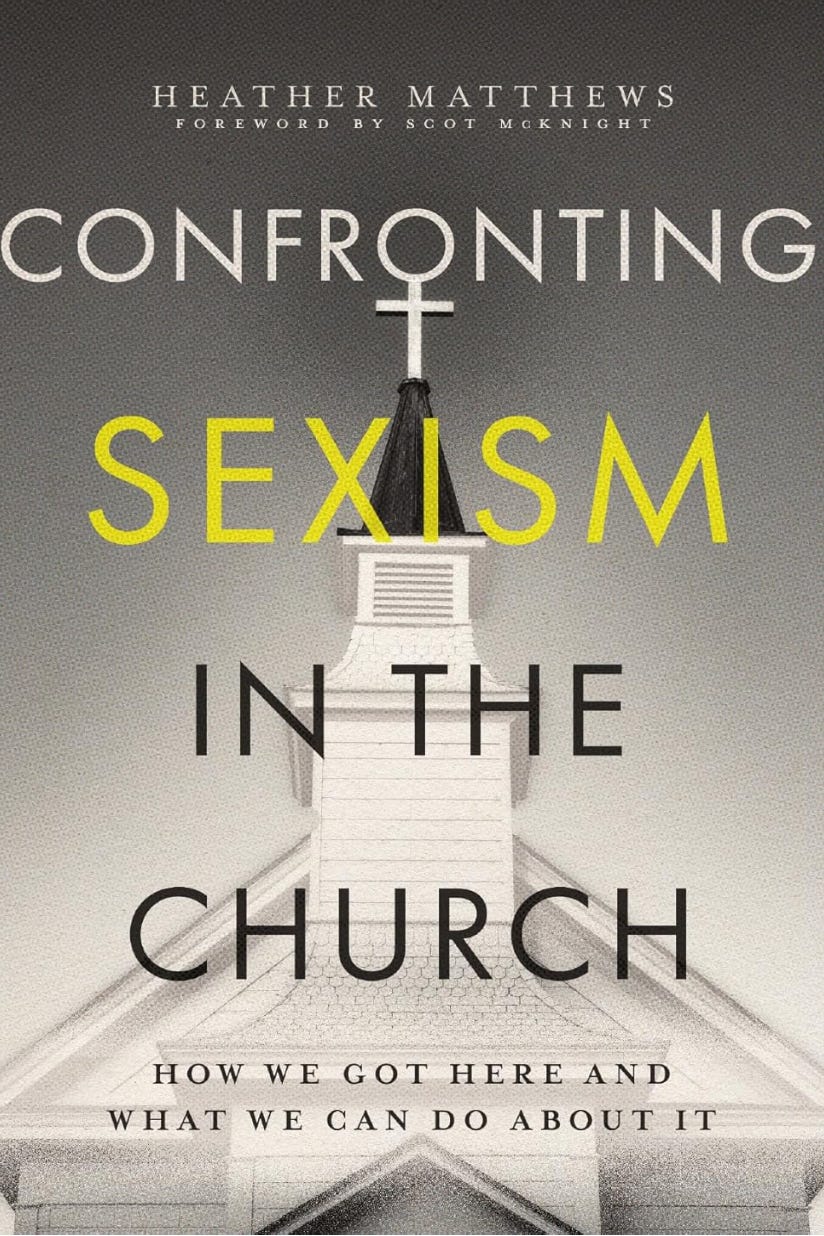By Kelly Edmiston
Confronting Sexism in the Church by Heather Matthews
I’ll never forget the first time I stepped into the pulpit at the Vineyard Church in Stafford, Texas in August 2019. I was the Youth Pastor at the time and my Lead Pastor Reagan Waggoner, asked me to preach a few weeks prior.
He said, “Hey, could you preach on 1 Peter?”
I said, “Um. Sure. Do you want to hear a sermon I have preached before, or something?”
He said, “I did. I googled you.”
I said, “Oh ok.”
He said, “You are called to preach.”
And then there was a long pause, as I fought back tears threatening to form. (Nope, don’t do that, I thought. My makeup is on point today.)
“Thanks,” I said.
“Yeah,” He said. “When you preach, your content is good. But it’s your presentation too. It’s how you embody the text and bring your story to it. It’s really powerful. I want to hear more of it.”
I sat there stunned in silence at the simplicity of the conversation. I had just come into the Vineyard that year and this was disorienting to me.
Did he not question whether or not I should be here?
Does he really intend for me to bring my full female self to this task of leadership?
Most men called to preaching ministry have the privilege of being a part of conversations like these from the time they begin theological studies or ministry training. They have mentors, professors, and friends who encourage (or discourage perhaps) their call. Some receive this affirmation of calling when they are in Elementary school as young boys are asked to read scripture and lead prayers from the pulpit from the time they can read. Men naturally have opportunities to grow and find their unique preaching voice. They work as “interns” where they hone their skills and receive feedback. They have hundreds of examples of preachers to learn from. They get the practice and repetition necessary for becoming an expert in any field. As I sat there in 2019 with my new boss, I realized I had never had this kind of conversation with anyone. Women are systemically deprived of these privileges that men take for granted. I had worked in the church for 12 years up to this point and no one had ever affirmed my call to ministry without questioning it
Standing in stark contrast to the conversation with my boss at the Vineyard was a conversation I had with a boss at another church a few years prior. He heard me preach a “youth sermon” (that’s what we call it in the Church of Christ!), and he was so impressed with my sermon that his idea of “mentoring” me was telling me that I should pursue a career as a news anchor.
He said, “Kelly, you are so good in front of people. You really bring the room alive with your energy. You should really consider a career on TV. You would be a great news anchor!”
I left this conversation feeling small and ashamed. He was trying to encourage me. But all I experienced was shame. I was ashamed of my gifts. I was ashamed of my body. I was ashamed of who I was. I didn’t tell anyone about this conversation because I was so embarrassed but in the secret places of my heart, I protested,
“I don’t want to be a news anchor. I want to spend my life helping people understand who Jesus is and how much God loves them.”
Until 2019, every single moment of my ministry life had been questioned. In 2019 during this conversation with Pastor Reagan Waggoner, I realized that my call was being affirmed without being questioned by a man in spiritual authority.
In the Vineyard, I am not confusing to anyone. I am not questioned because I am a woman. I am not told I should go and get another job where my skills can really be used. No one in our congregation is wondering what I am doing preaching, and now shaping and leading the congregation as the Lead Pastor. For the Vineyard, I am a woman called to ministry, invited to lead, and encouraged to grow.
My story is one of thousands of reasons why Heather Matthew’s book, Confronting Sexism in the Church, matters immensely. We need more stories like mine. We need more Lead Pastors who are women. We need more preachers who are women. We need more women living fully into the call of God on their lives. We need more movements like the Vineyard that are changing the History of how the evangelical church treats women.[1] We need more male leaders calling women leaders into ministry as collaborators in the gospel without questioning whether or not they should be there.
In Chapter 4 of Confronting Sexism in the Church, Matthews provides a depressing but necessary history of sexism. Sexism plagues the church today and we cannot forge a more just future without a reckoning with our past.
Matthews sums it up succinctly when she writes, “Since the early church, women have been systematically repressed, oppressed, and prevented from being fully human.” Matthew’s insistence, throughout the book, that the sexism women face is a barrier to their God-given right to full and human flourishing is an important distinctive that many egalitarians and egalitarian resources miss. Matthews continually brings the reader back to this problem. This is the problem to be solved. Starting in Genesis and ending with Mars Hill and the SBC, Matthews appropriately gathers the historical context for the problem we are trying to solve. Confronting Sexism in the Church is a must-read for any Christian who cares about the future of the church.
Follow Kelly’s work here:
[1] All Vineyard churches are egalitarian in theology, although not all women experience the same level of freedom that I have experienced. Every Vineyard Church is autonomous. I am not speaking for the Vineyard overall. I am speaking from my experience.







As someone who grew up SBC, with clear pastoral gifts that were never affirmed or given a chance to develop, Kelly's story brings me to tears. How many of us are out there? I am so thankful that the Vineyard and other denominations (PC USA for me) exist, to show us that there is a broader and more generous way.
Kelly, I really liked what you wrote. You made Pastor Waggoner sound like his core value was he valued you as a whole human being. No consideration about the clay jar you inhabit. How refreshing. And encouraging for you! I hope you had a great time preaching and you receive lots of invitations.